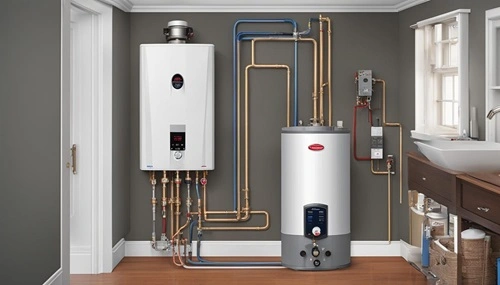In the quest for energy efficiency and convenience, tankless water heaters have gained popularity as an alternative to traditional storage water heaters. These systems, also known as on-demand or instant water heaters, heat water only when needed, eliminating the need for a storage tank. While tankless water heaters offer many benefits, they are not without their drawbacks.
This article delves into the pros and cons of tankless water heaters, helping you determine whether this modern solution is the right fit for your home.
What is a Tankless Water Heater?

A tankless water heater heats water directly as it flows through the unit. Unlike traditional water heaters, which maintain a reservoir of hot water, tankless systems activate when you turn on a hot water tap. Using either gas or electricity, they quickly heat the water to the desired temperature, delivering it continuously without the limitations of a storage tank.
The Pros of Tankless Water Heaters
1. Energy Efficiency
One of the most significant advantages of tankless water heaters is their energy efficiency. Traditional water heaters maintain a constant temperature in a storage tank, consuming energy even when hot water is not being used (a phenomenon known as standby heat loss). Tankless systems eliminate this inefficiency by heating water only when needed, potentially reducing energy consumption by 24%–34% for households that use less than 41 gallons of hot water daily.
2. Endless Hot Water
Unlike storage water heaters that can run out of hot water after the tank is depleted, tankless systems provide an unlimited supply. As long as the unit’s capacity is not exceeded, you can enjoy continuous hot water, making it ideal for families with high water usage or for activities like back-to-back showers.
3. Space-Saving Design
Tankless water heaters are compact and can be mounted on walls, saving valuable floor space. Their smaller size makes them an excellent choice for homes with limited storage or for those looking to declutter utility areas.
4. Longer Lifespan
The average lifespan of a tankless water heater is around 20 years, compared to 10–15 years for traditional storage water heaters. This extended lifespan can offset the higher upfront cost over time, providing better long-term value.
5. Reduced Risk of Water Damage
Since tankless water heaters do not store water, there is a lower risk of leaks or ruptures that can lead to water damage in your home. This makes them a safer option for homeowners concerned about potential flooding from a failing storage tank.
6. Environmental Benefits
The increased energy efficiency and reduced reliance on fossil fuels (in the case of electric units) contribute to a lower carbon footprint. For eco-conscious homeowners, tankless water heaters offer a greener alternative to traditional systems.
7. Customizable Temperature Control
Many tankless units come with advanced features like digital thermostats, allowing you to precisely control the water temperature. This ensures comfort and safety, especially in households with children or elderly individuals.
The Cons of Tankless Water Heaters
1. Higher Initial Cost
Tankless water heaters have a significantly higher upfront cost compared to traditional storage water heaters. The price of the unit itself, combined with installation costs, can be daunting for homeowners on a budget. Gas-powered models, in particular, often require venting systems and upgrades to the gas supply line, further increasing installation expenses.
2. Limited Flow Rate
While tankless water heaters provide endless hot water, their flow rate is limited by the unit’s capacity. Simultaneous usage in larger households—such as running multiple showers, a dishwasher, and a washing machine—can strain the system, leading to reduced water temperature or flow.
3. Dependency on Power Supply
Tankless water heaters rely on electricity or gas to function. In the event of a power outage, electric models will not work, and gas models may require electricity to power their ignition systems. This can be a disadvantage in areas prone to power outages or natural disasters.
4. Retrofitting Challenges
Installing a tankless water heater in an older home may require significant upgrades to the electrical or gas systems, depending on the unit type. These retrofitting requirements can increase installation time and cost, making the switch less feasible for some homeowners.
5. Maintenance Requirements
Tankless water heaters require regular maintenance to prevent scaling and mineral buildup, especially in areas with hard water. Without proper care, efficiency and performance can decline over time. Homeowners may need to invest in a water softener or schedule annual descaling services, adding to ongoing maintenance costs.
6. Higher Operating Costs for Certain Models
While electric tankless water heaters are energy-efficient, gas models may have higher operating costs due to fuel consumption and the need for proper venting. The type of unit you choose and your energy rates will significantly influence operating expenses.
7. Initial Temperature Delay
Although tankless water heaters eliminate the standby heat loss of traditional systems, they can introduce a slight delay in delivering hot water. This is because the unit needs to activate and heat the water as it flows. For some homeowners, this delay can be inconvenient, particularly in homes with long plumbing runs.
Who Should Consider a Tankless Water Heater?
Tankless water heaters are ideal for individuals or families who:
- Want to reduce energy consumption and utility bills.
- Have limited space and need a compact solution.
- Use moderate amounts of hot water and do not frequently run multiple fixtures simultaneously.
- Are looking for a long-term investment with minimal environmental impact.
- Are willing to pay higher upfront costs for the benefits of efficiency and convenience.
However, households with high simultaneous hot water demand or those on a tight budget may find traditional water heaters more suitable for their needs.
Tips for Choosing and Installing a Tankless Water Heater
- Assess Your Hot Water Needs: Calculate the peak hot water demand in your home to determine the appropriate flow rate (measured in gallons per minute) for your tankless water heater.
- Choose the Right Type: Decide between gas and electric models based on your energy source, budget, and installation feasibility.
- Consult a Professional Installer: Proper installation is critical for optimal performance. A licensed professional can ensure that the unit is correctly installed, vented, and compatible with your home’s plumbing and electrical systems.
- Plan for Maintenance: Be proactive about descaling and system maintenance, especially if you live in an area with hard water.
- Compare Brands and Models: Research reputable brands and read reviews to choose a unit that meets your needs and budget. Look for energy-efficient models with certifications like Energy Star ratings.
Conclusion
Tankless water heaters offer a modern solution for homeowners seeking energy efficiency, endless hot water, and space-saving benefits. Their long lifespan and reduced environmental impact make them an appealing choice for eco-conscious individuals. However, the higher upfront cost, limited flow rates, and maintenance requirements may deter some buyers.
Ultimately, the decision to invest in a tankless water heater depends on your household’s needs, budget, and long-term goals. By carefully weighing the pros and cons, consulting with professionals, and choosing the right model, you can enjoy the many benefits of this innovative technology while minimizing potential drawbacks.



